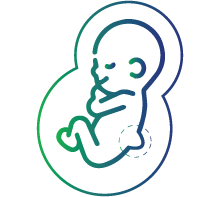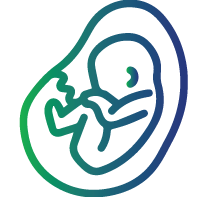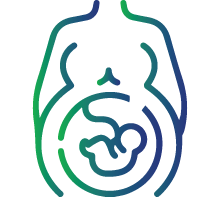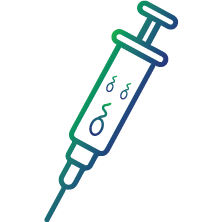
Maternal Markers Test
What are maternal markers?
Simply put, markers are indicators. Certain substances in the body, depending on their amount, are indicators of certain medical conditions and are tested for acceptable or normal ranges. These indicators present in the blood serum of pregnant women are used as markers during prenatal screening for certain fetal abnormalities such as genetic disorders and birth defects.
The maternal serum marker screening is used to screen the risk of carrying a fetus with certain genetic defects that includes Down’s syndrome (trisomy 21), Edward’s syndrome (trisomy 18), and neural tube defects (like spina bifida or anencephaly) in pregnant women. Maternal markers test is not a diagnostic test.
When is the screening recommended?
The maternal serum marker test is a screening test that is prescribed to all pregnant women around 15-21 weeks of the pregnancy (second trimester), regardless of age. If a pregnant woman shows signs of fetal abnormalities in the first trimester screening that includes blood test and an ultrasound then the doctor may suggest the maternal serum marker test in the second trimester.
What sample is collected?
A blood sample is taken from a vein in the pregnant woman's arm.
What is maternal marker screening used for?
Maternal serum analysis in pregnant women helps to identify fetus at risk for:

Neural Tube Defects (NTDs) like spina bifida

Trisomy 21 (Down syndrome)

Trisomy 18 (Edwards syndrome)

Fragile X syndrome (FXS)

Cardiac abnormalities

Maternal-fetal conditions like pre-eclampsia
What does a maternal marker test measure?
The blood sample is tested for:
Alpha-fetoprotein (AFP)
-
It is easily detectable in early development of fetus. It is a protein produced from the liver of the baby. When certain conditions affect a baby (like NTDs) an increased amount of AFP leaks into the amniotic fluid which travels into the mother’s blood through placenta.
Human chorionic gonadotropin (hCG)
-
It is a hormone produced by the placenta. In pregnant women where the fetus is carrying the chromosomal defect resulting in Down syndrome, hCG level tends to be high whereas in the fetus having the chromosomal defect resulting in Edwards syndrome, hCG levels are low.
Unconjugated estriol (uE3)
Inhibin A
-
It is a hormone produced by the placenta. Inhibin A levels are higher in pregnant women where the fetus has Down syndrome.
Factor’s affecting maternal marker analysis include:

Maternal weight

Maternal age

Insulin dependent diabetes mellitus

Carrying one or more than one fetus

If a pregnancy is through in vitro fertilization (IVF)

Smoking
Preparation for test
No special preparation is required for this test.
Interpretation of Results
|
AFP level |
hCG level |
uE3 level |
Inhibin A level |
Disorder |
|
Increased |
Normal |
Normal |
Not applicable |
NTDs |
|
Decreased |
Increased |
Decreased |
High |
Downs syndrome |
|
Decreased |
Decreased |
Decreased |
Not applicable |
Edwards syndrome |
Deviation from normal levels indicates the following:
- When the fetus carries the chromosomal defect that results in Down syndrome (trisomy 21), the levels of AFP and unconjugated estriol are low, hCG and inhibin A levels high.
- When the fetus has Edwards syndrome (trisomy 18), unconjugated estriol, hCG and AFP levels are low.
- Fetus with an open neural tube defect has an opening in its spine or head that results in increased amounts of AFP to pass into the mother’s blood.
- Positive screening test results are not diagnostic of a fetal abnormality. While they indicate an increased risk, only very few pregnant women who have positive maternal serum screening results have babies with a neural tube defect or chromosomal abnormality.
FAQs
What are the risks involved in a maternal marker test?
This test involves negligible risk. There might be slight pain or tenderness around the site where the needle went in. Rarely, the site can become infected.
What is the turnaround time (TAT) for the results of a maternal marker test?
Results of a maternal marker test are usually available within 10-12 days, although it could take longer at times.
What are the limitations of this test?
This test has the disadvantage of a lower detection rate than first trimester screening and integrated prenatal screening. It is usually performed after 14 weeks of pregnancy and misses the opportunity of early detection, which delays decision making about further testing (like amniocentesis), and therefore leads to late diagnosis.
How accurate are the test results?
The accuracy of the test depends on the accurate determination of the fetus’s gestational age.
|
Disorder |
Age |
Accuracy percentage |
|
Neural tube defects |
Includes all ages of pregnant women |
80% - 85% |
|
Down’s syndrome |
<35 years >35 years |
60% - 70% 80% - 90% |
|
Edward’s syndrome |
Includes all ages of pregnant women |
60% - 80% |
Why is it necessary to get a maternal marker test done?
Maternal marker screening aids in early detection of abnormalities in fetuses and tells the doctor if further testing is required. Early detection allows for specialized prenatal treatment and regular monitoring of fetus health.

